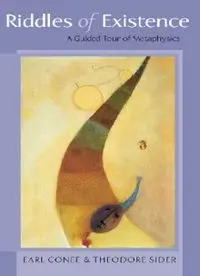Table Of ContentRiddles of Existence
A Guided Tour of Metaphysics
The questions of metaphysics are among the deepest and most
puzzling. What is time? Am I free in my actions? What makes me
the same person I was as a child? Why is there something rather
than nothing?
Riddles of Existence makes metaphysics genuinely accessible,
even fun. Its lively, informal style brings the riddles to life and
shows how stimulating they can be to think about. No philo-
sophical background is required to enjoy this book. It is ideal for
beginning students. Anyone wanting to think about life’s most
profound questions will find Riddles of Existence provocative and
entertaining.
Earl Conee is Professor of Philosophy at the University of
Rochester, New York.
Theodore Sider is Professor of Philosophy at New York University.
This page intentionally left blank
Riddles of Existence
A Guided Tour of Metaphysics
Earl Conee and Theodore Sider
CLARENDON PRESS OXFORD
3
Great Clarendon Street, Oxford ox2 6dp
Oxford University Press is a department of the University of Oxford.
It furthers the University’s objective of excellence in research, scholarship,
and education by publishing worldwide in
Oxford New York
Auckland Cape Town Dar es Salaam Hong Kong Karachi
Kuala Lumpur Madrid Melbourne Mexico City Nairobi
New Delhi Shanghai Taipei Toronto
With offices in
Argentina Austria Brazil Chile Czech Republic France Greece
Guatemala Hungary Italy Japan Poland Portugal Singapore
South Korea Switzerland Thailand Turkey Ukraine Vietnam
Oxford is a registered trade mark of Oxford University Press
in the UK and in certain other countries
Published in the United States
by Oxford University Press Inc., New York
ß Earl Conee and Theodore Sider 2005
The moral rights of the authors have been asserted
Database right Oxford University Press (maker)
First published 2005
First published in paperback 2007
All rights reserved. No part of this publication may be reproduced,
stored in a retrieval system, or transmitted, in any form or by any means,
without the prior permission in writing of Oxford University Press,
or as expressly permitted by law, or under terms agreed with the appropriate
reprographics rights organization. Enquiries concerning reproduction
outside the scope of the above should be sent to the Rights Department,
Oxford University Press, at the address above
You must not circulate this book in any other binding or cover
and you must impose the same condition on any acquirer
British Library Cataloguing in Publication Data
Data available
Library of Congress Cataloging in Publication Data
Data available
Typeset by SPI Publisher Services, Pondicherry, India
Printed in Great Britain
on acid-free paper by
Clays Ltd, St Ives plc
ISBN 978–0–19–928226–5 (hbk) 978–0–19–921518–8
1 3 5 7 9 10 8 6 4 2
contents
List of Figures vii
Introduction 1
1. Personal Identity 7
2. Fatalism 22
3. Time 44
4. God 62
5. Why Not Nothing? 87
6. Free Will and Determinism 112
7. Constitution 134
8. Universals 154
9. Possibility and Necessity 181
10. What is Metaphysics? 197
Acknowledgments 207
Index 209
This page intentionally left blank
list of f igures
1. The movement of a train defined by reference
to time 45
2. The moving of the present moment 46
3. High-school physics graph of a particle moving
through time 48
4. Space-time diagram 49
5. Where is the ‘real here’? 51
6. ‘Now’ for me and for Guy Fawkes 52
7. Moving back and forth in space 55
8. Moving back and forth in time, temporal
axis vertical 56
9. Moving back and forth in time, temporal
axis horizontal 56
10. Four-dimensional perspective on the clay statue 148
11. David Lewis’s actual and possible worlds 193
This page intentionally left blank
Introduction
You have a choice before you. Will you continue reading this
book? Take your time, make up your mind . . . OK, time’s up.
What is your decision?
If you have reached this sentence, your decision must have
been yes. Now, think back to your decision. Was it a free decision?
Could you have put the book down? Or did you have to keep
reading?
Of course you could have put the book down; of course your
decision was free. We human beings have free will.
Not so fast. We human beings are made of matter, tiny
particles studied by the sciences. And the sciences, especially
physics, discover laws of nature that specify where these particles
must move. Given the forces that were acting on the particles,
your body had to move the way it did, and so you had to continue
to read. How then was your decision free?
This is the problem of free will. It is a tough problem. We all
believe that we have free will, and yet scientiWc laws govern
the matter making up our bodies, determining what we will do
next. So do we have free will? Chapter 6 discusses this problem
in depth, and suggests a certain answer. But it is not so important
to us that you agree with our answer. What we really hope is

